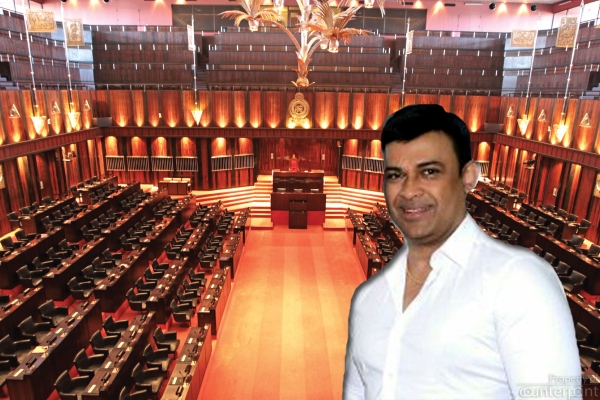Sumanthiran reminds the House of the provisions of the ICCPR to which Sri Lanka is a signatory
Sajith tells there is no punishment prescribed for contempt of court
By our lobby correspondent
Speaker Mahinda Yapa Abeywardena told Parliament today (19) that he needs three weeks’ time to decide whether convicted Parliamentarian Rajan Ramanayake could be allowed in the proceedings of the House.
The prevailing situation owing to the Covid pandemic have compelled me to delay matters including necessary legal consultations the Speaker said
He said any member needing to clarify matters arising form todays debate could make written submission within two weeks.
The Speaker was responding to a pertinent question raised by opposition Leader Sajith Premadasa as to what forced him to prevent MP Ramanayake from attending the proceedings of the House following the same modus operandi used in the case involving Premalal Jayasekara alias Choka Malli who was sentenced to death by the Rathnapura High Court.
Many arguments ensued when Opposition leader Premadasa stated that there is no punishment stipulated the in the constitution for contempt of court.
Justice Minister Ali Sabry admitting that there was no contempt law in the country said that he regrets, MP Ramanayake had been incarcerated for contempt. Qualifying his statement, he said “You can offer constructive criticism but if you but if you go beyond a certain limit, the court cannot sit idle especially in cases of scandalizing the court. There is enormous power vested with the Supreme Court in cases where the punishment had not been prescribed.”
Opposition Leader said that it was not the intention of the opposition to challenge the judgement in the House.
it would happen elsewhere in a different forum on the merits of the case he added.
“All what we want to know is as to why MP Ramanayake was not allowed to participate in the proceedings when the Election Commission has held that the convicted Parliamentarian would lose his seat only after six months of the actual judgement handed down to him. I invite you all to read articles 66,89,91, and 105 to get a better understanding of facts related to the matter.
Mr. Premadasa reminded the Speaker the very words he used, permitting Premalal Jayasekara convicted of murder to attend Parliament. The Speaker making his ruling on that occasion stated that we could not snatch the rights of the voters who have elected him thus I direct the Prison authorities to bring him to Parliament, when the sessions are on.
JVP leader Anura Kumara Dissanayake recalled the case of former minister S.B. Dissanayake where he was convicted by the Supreme Court for a similar offence. There he did not lose his seat, he only lost it when he failed to be present in the House for period longer than three moths and since he could not avail necessary leave.
However, S.B. Dissanayake clarified the point and said that Ranjan Ramanayake is poised to lose his seat from the very moment he was sentenced by the Supreme Court and in addition he would lose civic rights for a period of seven years .He was more or less depending on the opinion expressed by the Attorney General and delivered to the secretary General of Parliament He said in his case he appealed to the UN and won but it was not accepted here.
At this juncture JVP leader Dissanayake said when Premalal Jayasekara was convicted in accordance with the existing provisions of the law he would have rendered disqualified to contest the August 5th Election if you apply the same principle as in the case of MP Ramanayake, since there was a considerable time in between the sentence and the actual appeal.
Justice minister Ali Sabry clarifying the point said the lawyers who appeared for MP Jayasekara immediately told court that their client would appeal against the conviction and there itself the order becomes inoperative and it was not necessary to file the appeal immediately the assumption is that the order is suspended since another higher Court has taken over the case.
Most of the speakers opined that there is no appeal against the order since the apex court gave the ruling. However, TNA Parliamentarian M.A Sumanthiran expressed a contrasting view saying that a criminal case always should have at least one appeal.
He referred to the ICCPR (International Covenant of Civil and Political Rights) law and reminded everybody including the Justice Minister that Sri Lanka is a signatory and that there is corresponding law which enables Ranjan Ramanayake to invoke and ask the Supreme court for an appeal. This quite possible in a criminal case since our law always recognizes an appeal against a criminal matter. However, he says that according to article 125 the responsibility of interpreting the constitution is the prerogative of the Supreme Court. The Supreme Court itself could sit as the Appellate court with a fuller bench since the Supreme Court in the first instance exercised the original jurisdiction.





